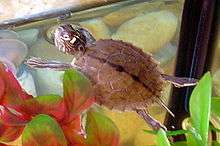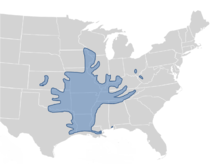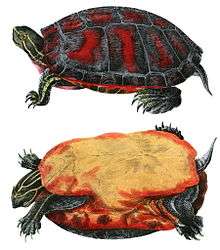Ouachita map turtle
| Ouachita map turtle | |
|---|---|
 | |
| A hatchling Graptemys ouachitensis in an aquarium | |
| Scientific classification | |
| Kingdom: | Animalia |
| Phylum: | Chordata |
| Subphylum: | Vertebrata |
| Class: | Reptilia |
| Order: | Testudines |
| Suborder: | Cryptodira |
| Family: | Emydidae |
| Subfamily: | Deirochelyinae |
| Genus: | Graptemys |
| Species: | G. ouachitensis |
| Binomial name | |
| Graptemys ouachitensis Cagle, 1953 | |
| Subspecies | |
| |
 | |
| Range map | |
The Ouachita map turtle or Sabine map turtle (Graptemys ouachitensis) is a species of turtle endemic to the United States.
Description
This species’ carapace features a row of low vertebral spines, and is serrated on the posterior rim. The carapace is olive, dark brown, or black in coloration with light yellowish markings with dark borders. The plastron color varies from cream to yellow and is patterned with dark lines and swirls. The body color is grayish brown to blackish and is marked with yellowish stripes.
Males are significantly smaller than females. The males can grow to be as large as 5 in (12 cm) in carapace length. The females can grow to be up to 10 in (25 cm) in carapace length.
Taxonomy
The 2 subspecies may represent full species.[2] The nominate subspecies, G. o. ouachitensis, ranges throughout the Mississippi River drainage. The other subspecies, G. o. sabinensis, is found in the Mermentau, Calcasieu, Sabine, and Neches river systems of Southwest Louisiana and East Texas.
Diet
Ouachita map turtles feed mainly on small aquatic animals such as shrimp, insects, molluscs, and fish. They also consume algae and aquatic plants.
Range
The Sabine map turtle (G. o. sabinensis), was observed and specimens collected (Four specimens), as far south as the upper Mermentau River in 1893 and 1894. In a 2013 observation field study of the Upper Mermentau, Lake Arthur, and 5 major tributaries including Bayou Plaquemine Brule, 73% of the turtles observed were G. sabinensis. The Graptemys pseudogeographica (the false map turtle), was observed as approaching extirpation in the drainage area accounted for only 0.2% of all turtles observed.[3]
Pet trade
As they are small, Ouachita map turtles are common among turtle keepers. They can be kept with most other species and can be raised on specialty pellets and dried shrimp. Although they need heat and ultraviolet light (UVB), they can generally be kept in average-sized aquariums.
References
- ↑ Graptemys ouachitensis, Reptile Database
- ↑ Stephens, P.R., and J.J. Wiens. 2003. Ecological diversification and phylogeny of Emydid turtles. Biol. Journ. Linn. Soc. 79 (4): 577-610.
- ↑ "Map Turtles of the Mermentau: Status Surveys of Forgotten Populations". Field observation: Vol. 13, Issue 1. Chelonian Conservation and Biology. July 2014. pp. 1–8. Retrieved 6 October 2015.
Further reading
- Cagle, F.R. 1953. Two New Subspecies of Graptemys pseudogeographica. Occ. Papers Mus. Zool. Univ. Michigan (546): 1-17. ("Graptemys pseudogeographica sabinensis, new subspecies", pp. 2–10; and "Graptemys pseudogeographica ouachitensis, new subspecies", pp. 10–16.)
- Conant, R. 1975. A Field Guide to Reptiles and Amphibians of Eastern and Central North America, Second Edition. Houghton Mifflin. Boston. xviii + 429 pp. + 48 Plates. ISBN 0-395-19979-4 (hardcover), ISBN 0-395-19977-8 (paperback). (Graptemys pseudogeographica ouachitensis and G. p. sabinensis, pp. 57–58, Figure 10. + Plate 8 + Map 14.)
- Lindeman, P.V. 2013. The Map Turtle and Sawback Atlas: Ecology, Evolution, Distribution, and Conservation. University of Oklahoma Press. Norman. 460 pp.
- Smith, H.M., and E.D. Brodie, Jr. 1982. Reptiles of North America: A Guide to Field Identification. Golden Press. New York. 240 pp. ISBN 0-307-13666-3 (paperback). (Graptemys ouachitensis ouachitensis and G. o. sabinensis, pp. 50–51.)
